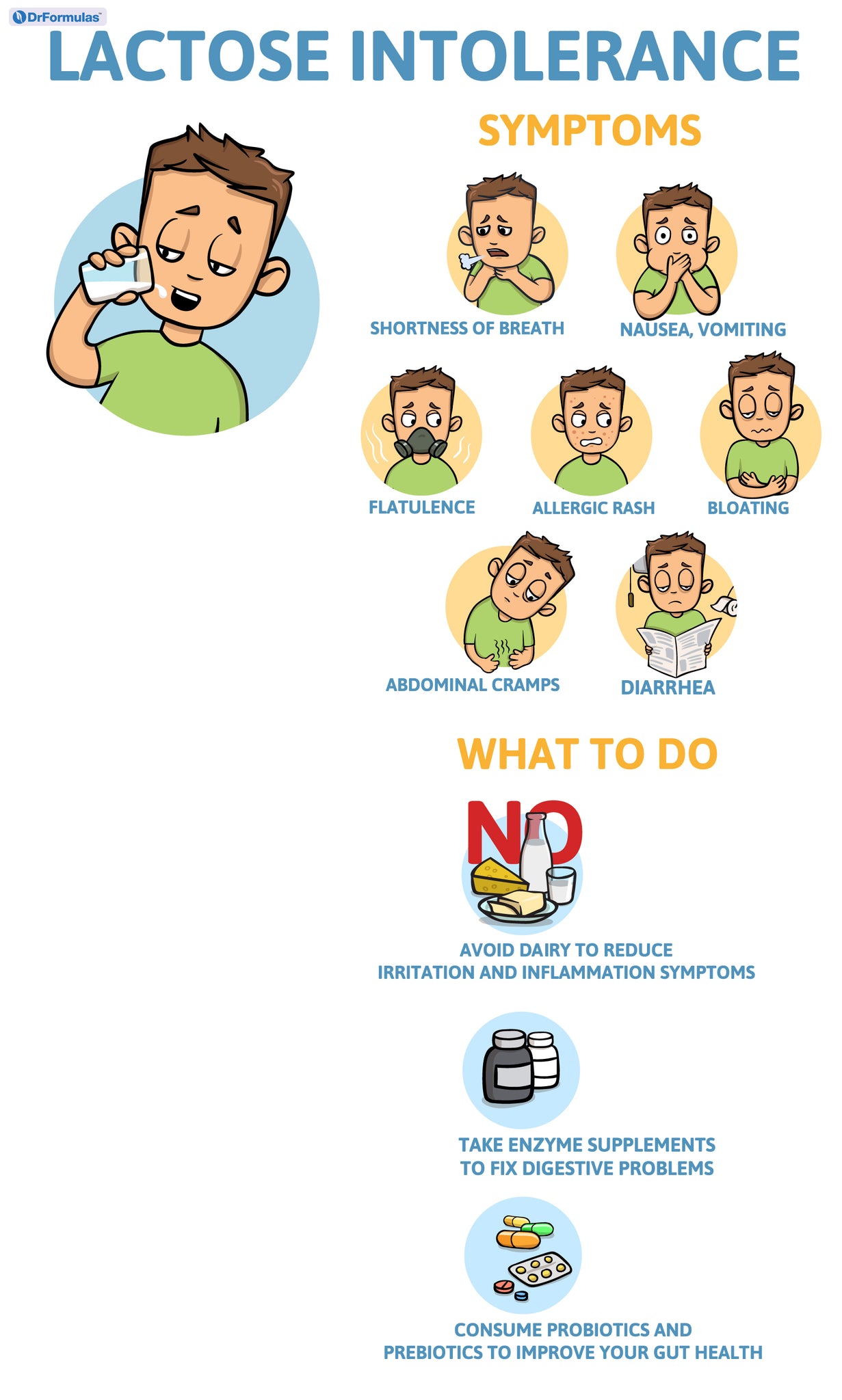
Lactose intolerance is the inability to digest the dairy sugar lactose. Around 25 percent of Americans stop producing lactase enzymes after they stop drinking milk[1]. People of Asian descent are more prone to being lactose intolerance. Lactose intolerance is not an allergy but an enzyme deficiency.
Symptoms of Being Lactose Intolerant
When lactose isn’t digested properly, it can cause discomfort throughout your digestive system. This is because lactose that isn’t digested by your body ends up being digested by the bacteria living in your gut. Discomfort from lactose intolerance usually begins between 30 minutes and two hours after eating or drinking dairy products, depending on how much you ate or drank. If you eat foods containing lactose before going to bed, sometimes the symptoms can appear in the morning. The most common symptoms include:
1. Nausea
2. Diarrhea
3.Stomach cramps
4. Vomiting
5. Gas and bloating
6. Pain when having a bowel movement
Testing for Lactose Intolerance
If you are experiencing these symptoms, you should discuss them with your doctor so that he or she can rule out other digestive disorders. You will know if you are lactose intolerant if the symptoms disappear when you cut foods containing lactose from your diet.

Lactose Intolerance Mechanism
Lactose is a sugar made of two simple sugars linked together, galactose and glucose. The cause of lactose intolerance is a deficiency in lactase, the intestinal enzyme that breaks down lactose into the simple sugars galactose and glucose. Most babies are born with the enzyme lactase and the ability to digest lactose. Some children become lactose intolerant as young as age two. Others may not develop lactose intolerance until early adulthood.
As you grow older, the LCT gene, which helps your body create lactase, becomes less active, so there’s nothing to break down lactose and prevent it from reaching your colon undigested. When this happens, bacteria in the colon break the sugars down, creating excess fluid and gas[2].
Can You Develop Lactose Intolerance?
Lactose Intolerant Foods
If you are lactose intolerant, then you should avoid the following high-lactose foods:
-
Milk and milk-based drinks, such as milkshakes
-
Coffee creamer and whipping cream
-
Ice cream
-
Butter
-
Cheese
-
Custards and milk-based puddings
-
Cream sauces and cream-based soups
You may be able to eat some forms of yogurt even if you are lactose intolerant. Greek yogurt, for instance, may not cause you discomfort if you are only slightly intolerant, due to most of the lactose being removed during its production process. If you are very intolerant, there are forms of lactose-free yogurt out there. Yogurt can also help because it contains probiotics, which are live bacteria that help the body digest lactose.
Treatments for Lactose Intolerance
You can avoid the discomfort of lactose intolerance by modifying your diet in three different ways. You can begin by eliminating foods and beverages containing lactose from your diet. If you miss eating and drinking dairy products, you can add lactose-free foods to your diet.
You can also take a digestive enzyme supplement, which many people refer to as lactose intolerance pills. Lactase is a type of beta-galactosidase (a type of enzyme), and lactase enzyme supplements contain varying amounts of beta-galactosidase. The concentration is usually expressed as FFC lactase units.
Probiotic supplements containing Lactobacillus[3] also support digestive health and helps the body digest lactose. These probiotics break down lactose into lactic acid which is easily absorbed by the body.
You can live a healthy life with lactose intolerance. What type of dietary modification works for you will depend upon how much lactose your body produces, and how balanced your intestinal bacteria is. It may take a little experimenting before you get it right, but once you do, you’ll be able to discover and enjoy modified versions of your favorite dairy dishes.
[1] https://www.ncbi.nlm.nih.gov/pmc/articles/PMC4586535/
[2] https://www.everydayhealth.com/news/can-you-develop-lactose-intolerance-later-life/
[3] https://www.ncbi.nlm.nih.gov/pubmed/20391953


